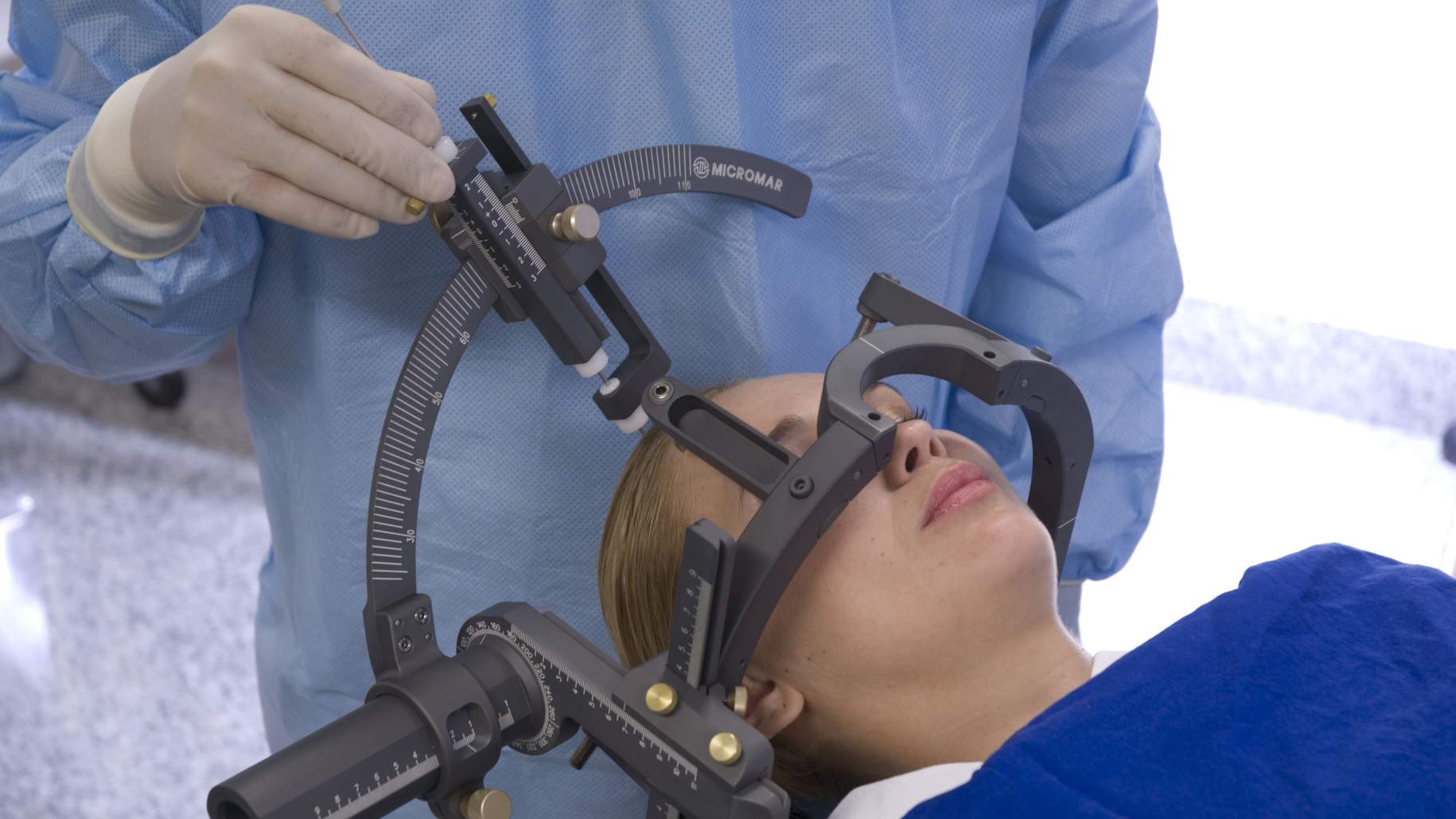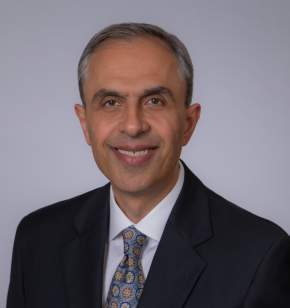Functional and Stereotactic Neurosurgery


Functional neurosurgery is a subspecialty of neurosurgery aimed at improving quality of life, typically from chronic neurological conditions. Procedures are precise, minimally invasive, and target some of the deepest areas of the brain to treat diseases ranging from chronic pain to movement disorders such as Parkinson’s Disease.
However, it can be confusing to understand what functional neurosurgery entails. Here, we will dive deeper into the field to provide insight into whether a consultation with this kind of subspecialist is right for you or your loved one.
What Is Functional Neurosurgery?
Functional neurosurgery is a broad subspecialty of neurosurgery that aims to modify the functions of the nervous system. This field of neurosurgery specializes in treating disorders of the central nervous system (CNS) by modulating the functions of the brain and the peripheral nerves using various techniques and procedures. Functional neurosurgery helps to treat patients with a variety of diagnoses, such as:
- Movement disorders like essential tremor, dystonia, and Parkinson's Disease
- Chronic pains like neuralgia, cancer-related pain, diabetic neuropathy, chronic back pain, among other types
- Spasticity disorders caused by injuries of nerves or spinal cord and cerebral palsy
- Psychiatric disorders like severe depression and obsessive-compulsive disorders resistant to medical therapy
What Does a Functional Neurosurgeon Do?
Functional neurosurgeons work closely with neurologists and treat patients experiencing chronic neurological disorders. Depending on the diagnosis, the neurosurgeon can perform one or more of the following surgical procedures:
- Intracranial monitoring: To evaluate the origin of seizures that are not responsive to medications
- Laser ablation surgery: To treat deep seated lesions in the brain not accessible to traditional surgeries
- Vagus nerve stimulation: To treat epilepsy
- Deep brain stimulation: To treat tremor and Parkinson’s Disease
- Microvascular decompression: To treat trigeminal neuralgia and hemifacial spasm
- Percutaneous rhizotomy: To treat trigeminal neuralgia
- Stereotactic radiosurgery: To treat tumors located in deep locations of the brain
A functional neurosurgeon's main role is to use the various techniques and procedures to improve the patient's quality of life by minimizing their neurological symptoms. Besides identifying the best procedures for the patient, functional neurosurgeons are also tasked with executing these procedures and observing the patient through the recovery period. The surgeons also work closely with other medical professionals including neurologists, pain medicine specialists, psychologists, and radiologists, depending on the patient's condition.
Why should you have your surgery with Dr. Cohen?
Dr. Cohen
- 7,500+ specialized surgeries performed by your chosen surgeon
- More personalized care
- Extensive experience = higher success rate and quicker recovery times
Major Health Centers
- No control over choosing the surgeon caring for you
- One-size-fits-all care
- Less specialization
For more reasons, please click here.
Types of Diseases Treated With Functional Neurosurgery
The field of functional neurosurgery is rapidly expanding. Experts believe that via continued research and testing, functional surgery could also help to treat addiction, depression, and other behavioral conditions. Currently, some of the diseases that rely on functional neurosurgery as a treatment method include:
Epilepsy
Functional neurosurgery presents various surgical techniques that can be used to diagnose, monitor, and manage seizures. Common treatments and techniques used for epilepsy include:
- Intracranial monitoring: placing of electrodes on the surface of the brain for monitoring purposes
- Laser ablation surgery: destroying the tissue that is causing seizures
- Vagus nerve stimulation: sending mild and regular electrical energy to the vagus nerve within the neck to treat seizures
Movement Disorders
Movement disorders is a blanket term that refers to a group of nervous system conditions that cause abnormal or increased movements. The movements might be voluntary or involuntary. These conditions include Parkinson’s disease, essential tremor, dystonia, and hemiballismus to name a few. Functional neurosurgery presents various treatments such as:
- Deep brain stimulation: a procedure that requires placement of an electrode in a specific location of the brain to improve the movements of patients suffering from epilepsy, essential tremor, and dystonia.
- Focused ultrasound: using high-intensity focused ultrasound energy guided by MRI to heat small, targeted areas of the brain tissue to reduce tremors.
Trigeminal Neuralgia
Trigeminal neuralgia is a chronic nerve pain, affecting the face. The condition is often treated using the following neurosurgical procedures:
- Microvascular decompression: this technique helps to correct mechanical causes of trigeminal neuralgia by preventing blood vessels from compressing the trigeminal nerve
- Percutaneous rhizotomy: this technique uses a needle or balloon to disrupt a portion of the trigeminal nerve so it can no longer send pain signals to the brain
- Stereotactic radiosurgery (SRS): this technique utilizes targeted beams of radiation to affect the nerve root responsible for symptoms
Chronic Pain
Patients suffering from various types of chronic pain, including headaches and back pain, have multiple functional neurosurgical treatment options available to them.
- Spinal cord stimulators: Spinal cord stimulators are an effective alternative for patients in cases where all other medical interventions have failed. The stimulators can have a long-term success rate ranging from 47% to 74% in carefully selected patients. Unfortunately, not everyone is a candidate.
- Intrathecal pumps: Intrathecal pumps are a common functional neurosurgery intervention that uses implanted pumps to deliver small doses of medication directly to the fluid that bathes the spinal cord (CSF).
Parkinson's Disease
Not all patients who have Parkinson's disease are eligible for functional surgery but those who satisfy certain criteria can benefit from deep brain stimulation. Similarly, patients who have a medically intractable tremor or are intolerant to the side effects of medication can be considered for several functional surgical treatment options, including deep brain stimulation.
Other conditions that functional neurosurgeons may treat include:
What Is the Future of Functional Neurosurgery for Patients?
Currently, most of the focus surrounding functional neurosurgery is aimed at helping patients achieve better mobility and functionality. However, there are some treatments that are being explored for patients with behavioral disorders. In the foreseeable future, functional neurosurgery may expand to help patients with behavioral conditions like obsessive compulsive disorder, severe depression, and eating disorders.
Key Takeaways
- Functional neurosurgery is a rapidly growing subspecialty in neurosurgery that is providing caregivers and patients with new ways of dealing with various chronic conditions that affect mobility and functionality such as movement disorders, epilepsy, chronic pain, and spinal cord injuries.
- With further research and testing, functional neurosurgery may also help patients with behavioral conditions.











